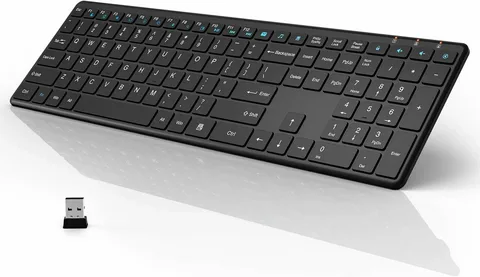When it comes to setting up a workspace, one of the key decisions is the type of keyboard to use. Many people are faced with the choice of whether to go for a compact keyboard or a full-size keyboard. The full-size option, which includes a standard layout with function keys, arrow keys, and a number pad, can take up significant desk space. But is a full size keyboard worth the space it occupies? In this article, we’ll break down the pros and cons to help you decide.
What Is a Full-Size Keyboard?
A full-size keyboard typically includes the following components:
- Alphanumeric Keys: The regular keys you use for typing.
- Function Keys: These are located at the top (F1 to F12) and serve specific purposes in various software applications.
- Arrow Keys: Four directional keys used for navigating.
- Number Pad: A block of keys on the right side, used for numeric input and simple calculations.
This configuration takes up more space than a tenkeyless or compact keyboard, but some users find the extra features essential. So, is a full-size keyboard worth the space? Let’s dive into the pros and cons.
Pros of Using a Full-Size Keyboard
1. More Comfortable for Typing and Data Entry
For users who regularly enter numbers or do extensive data input, the number pad on a full-size keyboard can be a game-changer. If your work involves frequent numerical calculations, the dedicated number pad will increase your efficiency compared to a compact layout where the numbers are integrated into the regular row of keys.
2. Improved Navigation with Function Keys and Arrow Keys
If you use keyboard shortcuts or frequently navigate through documents and applications, having function keys and dedicated arrow keys can significantly improve your productivity. These keys offer quicker access to certain commands, saving you time and reducing the need for mouse interaction.
3. Better for Gaming and Media Control
Many gamers prefer a full-size keyboard because the additional keys offer customization options for in-game commands and macros. Similarly, media controls (like volume up/down, mute, play/pause) often come built into full-size keyboards, making it convenient to control your music or videos without interrupting your workflow.
4. More Familiar Layout
If you’re transitioning from a traditional desktop setup or are used to a full-sized keyboard at work, sticking with this layout can be more comfortable. The larger size might feel more natural, and you won’t need to adjust to a different arrangement when switching between devices.
Cons of Using a Full-Size Keyboard
1. Takes Up More Desk Space
One of the main drawbacks of a full-size keyboard is its size. Full-size models can occupy a significant portion of your desk, which may be a concern if you have limited space. This can also lead to a cluttered or cramped workspace, making it harder to keep your desk tidy and organized.
2. Less Portability
If you often take your keyboard with you (for example, to work, meetings, or travel), a full-size keyboard is not as portable as a compact version. It’s heavier and bulkier, which may make it more difficult to carry around. For people who work on the go or have limited space in their bag, a smaller keyboard might be a better fit.
3. Less Ergonomic
While a full-size keyboard offers more functionality, its larger size may also lead to ergonomic challenges. The extended layout can encourage more wrist movement, potentially leading to strain if you don’t position your keyboard correctly. This can be particularly uncomfortable during long typing sessions or when performing repetitive tasks.
4. Not Always Necessary for Every User
For users who do not require the number pad or extensive function keys, a full-size keyboard might feel like overkill. Many people find that a smaller keyboard, like a tenkeyless or even a 60% keyboard, provides all the essentials without the extra bulk.
Is a Full-Size Keyboard Worth the Space?
So, is a full-size keyboard worth the space? The answer really depends on your needs and workspace constraints. If you’re someone who frequently types numbers, uses function keys, or plays games, the extra space may be justified. For people who value efficiency and a familiar layout, the full-size keyboard offers numerous advantages that can enhance productivity and comfort.
On the other hand, if desk space is at a premium or you’re someone who doesn’t use the extra features often, a more compact option might serve you better. A smaller keyboard may be more portable, ergonomic, and allow for a cleaner, more organized desk.
Conclusion
Choosing between a full-size keyboard and a more compact model ultimately comes down to your personal preferences and how you use your keyboard. If you value functionality, comfort, and have the space for it, a full-size keyboard could be an excellent addition to your setup. However, if you’re tight on space or don’t need all the extra keys, you might find a smaller keyboard more convenient and practical.


